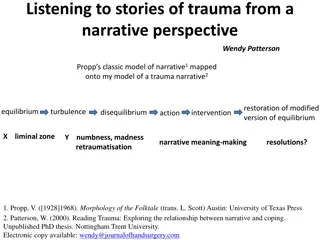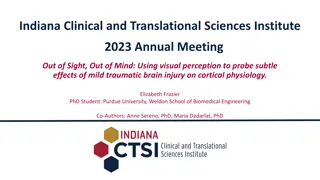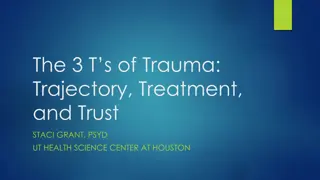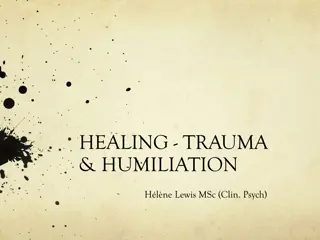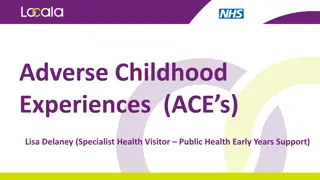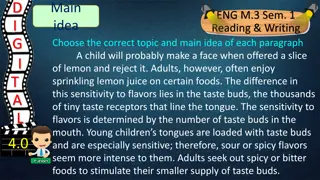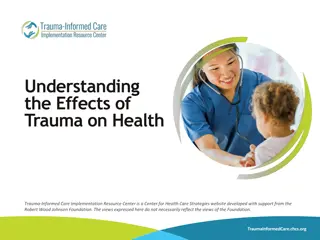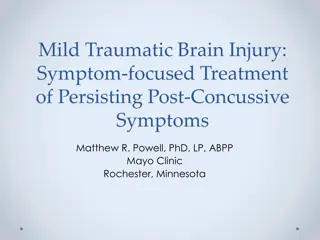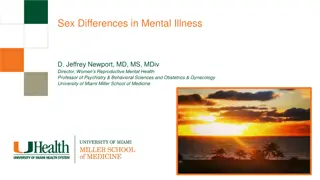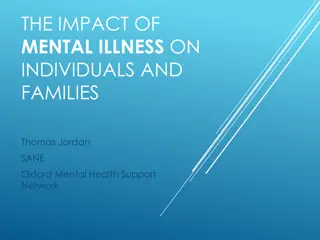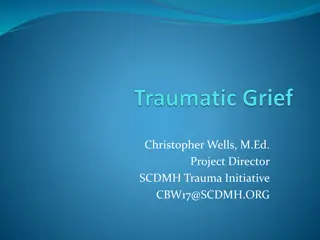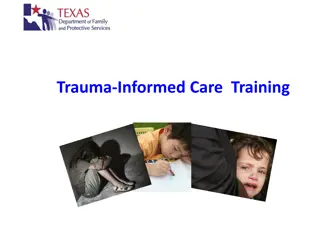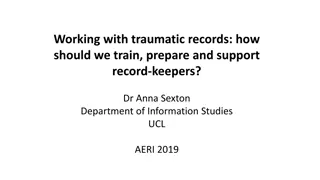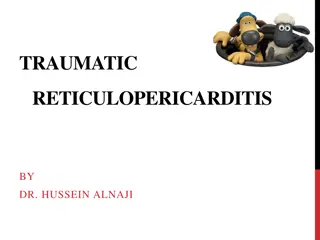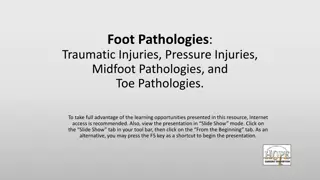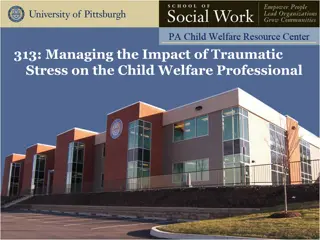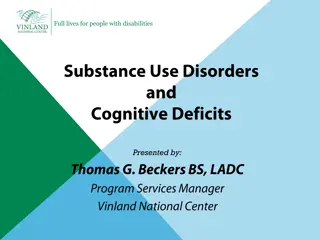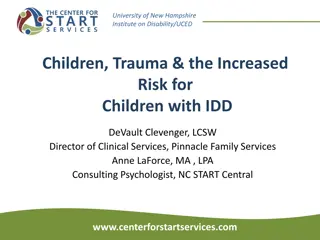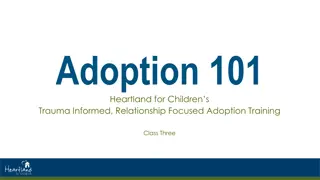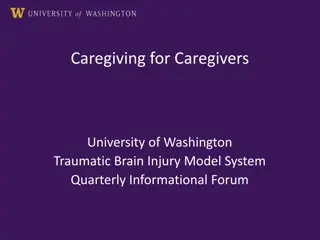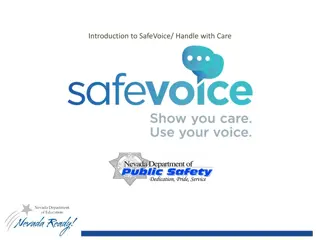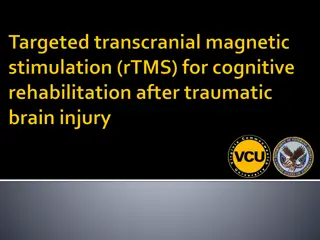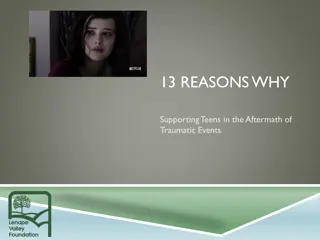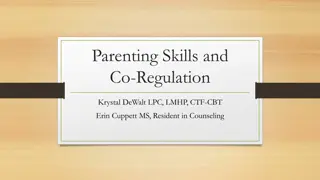Understanding Venous Thromboembolism in Orthopedic Patients
This educational content covers the basics of deep vein thrombosis (DVT) and pulmonary embolism (PE), including definitions, pathophysiology, risk factors, prevention strategies, diagnosis, and treatment. Traumatic and non-traumatic risk factors for VTE in orthopedic patients are discussed, emphasiz
0 views • 36 slides
Understanding Trauma's Impact on the Brain: A Comprehensive Overview.
This content delves into the neurobiology of trauma, exploring how different brain systems are affected by traumatic experiences. It covers topics such as amygdala hijack, coping skills, and the Polyvagal Theory. A survivor's experience is shared to provide insight into the real impact of trauma on
2 views • 29 slides
Understanding Vicarious Trauma: The Impact and Coping Strategies
Vicarious trauma involves indirect exposure to traumatic experiences through listening to others' stories or viewing disturbing content, leading to changes in beliefs and emotional well-being. While it can result in positive growth, it also carries risks of compassion fatigue and burnout. Managing e
7 views • 16 slides
Understanding Trauma Narratives: A Narrative Perspective
Exploring trauma narratives through the lens of Wendy Patterson Propp's classic narrative model, this study delves into the restoration of equilibrium, the disruption of disequilibrium, and the intervention actions within the liminal zones of trauma narratives. It emphasizes narrative meaning-making
5 views • 5 slides
Investigating Visual Perception Effects of Mild Traumatic Brain Injury
Elizabeth Frazier, a PhD student at Purdue University, explores the subtle effects of mild traumatic brain injury (mTBI) on cortical physiology using a novel two-alternative forced choice task in mice. The study aims to bridge visual deficits and cortical circuitry changes post-mTBI to improve diagn
0 views • 5 slides
Understanding the 3 Ts of Trauma: Trajectory, Treatment, and Trust
This comprehensive guide delves into the critical aspects of trauma - Trajectory, Treatment, and Trust. It covers the definition of trauma, PTSD symptoms, potentially traumatic events, trajectories of traumatic stress, and the impact of trauma on mental health. Explore the effects on behavior, biolo
0 views • 29 slides
Understanding Trauma and Healing: Insights from Neuroscience
Recent neuroscience findings based on the work of Professor Bessel van der Kolk shed light on how trauma affects the human organism. Traumatic experiences leave lasting legacies on individuals, families, and societies, impacting mental, emotional, and physical well-being. The profound changes trauma
0 views • 32 slides
Impact of Adverse Childhood Experiences (ACEs) on Individuals and Society
Adverse Childhood Experiences (ACEs) encompass a wide range of traumatic events during childhood that can have long-lasting effects on individuals. These experiences, such as abuse, neglect, and family issues, can significantly increase the risk of developing harmful behaviors and health conditions
1 views • 15 slides
Understanding Urological Emergencies: Causes, Symptoms & Treatment
Discover the different types of urological emergencies, both traumatic and non-traumatic, including hematuria, renal colic, urinary retention, acute scrotum, and more. Learn about the causes, symptoms, and immediate treatments required for these urgent urological conditions. Find out how to identify
3 views • 67 slides
Understanding Fractures: Traumatic vs. Pathological and Modeling Options
Defining the distinction between traumatic and pathological fractures, exploring the relationship between non-traumatic fractures and underlying bone pathologies, and discussing modeling options for classifying fractures. Stress fractures, insufficiency fractures, and the causes of pathological frac
3 views • 8 slides
Understanding Traumatic Reticuloperitonitis in Cattle
Traumatic reticuloperitonitis, also known as hardware disease, is a serious condition in cattle caused by the ingestion of foreign objects. The perforation of the reticulum wall leads to peritonitis and potential complications affecting various body systems. Recognizing the clinical signs, such as s
0 views • 10 slides
Understanding Prognosis in Traumatic Brain Injury
Prognosis in traumatic brain injury is influenced by various factors such as population characteristics, impairment levels, and time frames. Predicting short-term and long-term outcomes is crucial for effective patient care, financial planning, and resource utilization. Common outcome measures inclu
0 views • 46 slides
Contrasting Reactions to Flavors and Traumatic Events
Children and adults demonstrate varying responses to flavors influenced by the number of taste buds in their mouth, while individuals affected by traumatic events like earthquakes can experience lasting changes in their sense of security, as seen through different behaviors and reactions over time.
0 views • 17 slides
Understanding the Effects of Trauma on Health: Insights from Trauma-Informed Care Implementation
Individual trauma and adverse childhood experiences can have lasting effects on mental, physical, social, and emotional well-being. The Trauma-Informed Care Implementation Resource Center provides valuable insights on defining trauma, examples of traumatic events, prevalence statistics, and types of
0 views • 11 slides
Understanding Mild Traumatic Brain Injury and Treatment Options
Exploring the pathophysiology and clinical recovery of mild traumatic brain injury (mTBI), along with the risk factors for persisting post-concussive symptoms. The importance of diagnosing mTBI and the impact it has on individuals. Highlighting the neurometabolic cascade and functional injuries asso
0 views • 37 slides
Understanding Sex Differences in Mental Illness and Its Impact
Exploring various aspects of mental health issues, this content sheds light on sex differences in depression, anxiety disorders, PTSD, and suicide rates. It discusses the age of onset for depression, the prevalence of anxiety disorders, and the challenges individuals face in dealing with mental illn
2 views • 10 slides
Traumatic Reticuloperitonitis (Hardware Disease) in Cattle: Causes and Clinical Signs
Traumatic reticuloperitonitis, also known as Hardware Disease, is a common condition in cattle caused by the ingestion of foreign objects. This article discusses its etiology, pathogenesis, and clinical findings such as sudden onset of rumino-reticular atony and decreased milk production. Perforatio
0 views • 10 slides
Psychosocial Care Training Workshop for Children in Difficult Circumstances
This training workshop focused on understanding children's psychosocial issues, linking child protection with psychosocial care, and developing essential skills for providing supportive care to children in challenging situations. Participants engaged in various interactive learning methods, includin
0 views • 85 slides
Brain Oxygen Optimization in Severe Traumatic Brain Injury (BOOST3) Trials Overview
Overview of the BOOST3 trials focusing on brain oxygen optimization in severe traumatic brain injury patients. The trials involve multiple PIs, training sessions, and hands-on ancillary studies. Various design principles and organizational values are emphasized, with grant awards distributed to diff
0 views • 13 slides
Complex Radiology Case: Multiple Traumatic Injuries in an Elderly Female
A 77-year-old female presented with multiple traumatic injuries after falling headfirst down stairs. Imaging revealed a comminuted inferior orbital wall fracture, facial lacerations, spinal fractures, and cervical cord syndrome. Lab findings indicated preexisting conditions like osteopenia, hyperten
0 views • 18 slides
Understanding the Impact of Mental Illness on Individuals and Families
This presentation delves into the profound impact of mental illness on individuals and families, exploring biological, genetic, chemical, and environmental factors that contribute to mental health struggles. It highlights societal pressures, traumatic experiences, and upbringing influences, shedding
0 views • 10 slides
Understanding Traumatic Grief and Bereavement: A Comprehensive Overview
Explore the complexities of traumatic grief, bereavement, and loss through a detailed examination of definitions, theories, stages, symptoms, impact, and risk factors. Unpack the nuances of acute grief, integrated grief, and the coping mechanisms individuals utilize when faced with profound loss. Ga
1 views • 117 slides
Understanding Trauma-Informed Care Training
Trauma-Informed Care Training involves understanding child traumatic stress, recognizing the effects of trauma on child development, behaviors, and functioning, as well as preventing and coping with Compassion Fatigue. It emphasizes creating safety for both providers and survivors and empowering sur
0 views • 55 slides
Supporting Record-Keepers Dealing with Traumatic Records
Understanding the impact of traumatic experiences on record-keepers is crucial in training, preparing, and supporting them. Trauma, whether singular, ongoing, or complex, can be represented in records stored in archives. The potentiality of records to carry traumatic experiences requires a thoughtfu
0 views • 15 slides
Traumatic Reticulopericarditis in Livestock: Causes, Symptoms, and Management
Traumatic reticulopericarditis in livestock is caused by penetration of the pericardial sac by a migrating metal foreign body, leading to pericarditis, toxemia, and congestive heart failure. Clinical signs include depression, anorexia, respiratory distress, and bilateral jugular distension. If chron
0 views • 13 slides
Understanding Foot Pathologies: Traumatic Injuries and Pressure Injuries
Explore common foot pathologies including traumatic injuries like plantar fasciitis, turf toe, and sprains, as well as pressure injuries such as plantar ulcers and heel spurs. Learn about the causes, symptoms, and treatment options for these conditions.
0 views • 33 slides
Managing Traumatic Stress in Child Welfare Professionals
Learn to identify, recognize, and manage traumatic stress as an occupational hazard in the child welfare profession. This program helps professionals assess the impact of traumatic stress and personal strengths, develop strategies to promote resiliency, and understand the importance of safety and cu
0 views • 30 slides
Value Measurement & Monetization of Visitor Experiences in Museums
This content explores how museums enhance visitor well-being and how measuring the perceived value of museum experiences can lead to quantifiable benefits. It delves into research findings on the impact of museum visits on personal, intellectual, social, and physical well-being, highlighting the imp
0 views • 11 slides
Full Lives for People with Disabilities - Addressing Traumatic Brain Injury
Traumatic Brain Injury (TBI) presents a significant public health concern in the United States, often termed as the silent epidemic due to its hidden nature. This condition affects thinking and memory, impacting individuals' lives profoundly. Resources such as "The Essential Brain Injury Guide" shed
0 views • 23 slides
Understanding Childhood Trauma and Its Impact on Children with IDD
Childhood trauma, defined as intense and overwhelming experiences causing harm to physical and emotional well-being, can have severe repercussions on children with Intellectual and Developmental Disabilities (IDD). This article discusses the concept of trauma, provides examples of traumatic experien
0 views • 45 slides
Understanding the Impact of Trauma on a Child's Brain Development
Dive into the complexities of how trauma affects a child's brain development, exploring the different parts of the brain involved and the responses triggered by traumatic experiences. Gain insights into the in utero effects of trauma, the role of cortisol in stress responses, and practical tips for
0 views • 23 slides
Understanding Traumatic Reticuloperitonitis in Cattle
Traumatic reticuloperitonitis in cattle is a severe condition caused by the penetration of the reticulum by metallic foreign objects. The ingestion of these objects leads to acute local peritonitis, with symptoms like anorexia, decreased milk yield, and pain during movement. If left untreated, it ca
0 views • 16 slides
Cognitive and Behavioral Management Strategies for Traumatic Brain Injury Patients
This presentation focuses on addressing challenging cognitive, behavioral, and personality issues associated with traumatic brain injury (TBI). It outlines cognitive issues such as attention, speed of processing, learning, memory, and executive functioning. Cognitive management strategies include te
0 views • 18 slides
Literary Exploration: Characters, Themes, and Narration in Hurston's Work
Delve into the intriguing narrative techniques employed by Hurston in her work, exploring character introductions, themes, and the unique perspectives presented. Reflect on the use of dialect, sociolect, and slang in novels, analyzing the impact on storytelling. Engage in discussions surrounding sur
0 views • 19 slides
Understanding Caregiving for Traumatic Brain Injury Survivors
Caregiving for individuals with Traumatic Brain Injury (TBI) is a crucial yet challenging role undertaken by family members or friends. The responsibilities can be overwhelming, impacting both the survivor and the caregiver's well-being. This presentation highlights the needs of caregivers, survivor
0 views • 22 slides
Understanding Post-Traumatic Stress Disorder (PTSD) and Trauma
Post-Traumatic Stress Disorder (PTSD) is a psychological condition that may develop after a person experiences a traumatic event. Trauma can result from various incidents such as accidents, natural disasters, abuse, or war, leading to personal reactions and challenges in one's perceptions. Victims o
0 views • 104 slides
Introduction to SafeVoice and Handle with Care Program
SafeVoice and Handle with Care program aims to receive tips, especially related to traumatic events involving children, and forward them to law enforcement and schools for necessary actions. The program, initiated through SB-80, emphasizes reporting traumatic events involving children within public
0 views • 9 slides
Cognitive Deficits and Treatment Options Following Traumatic Brain Injury
Traumatic Brain Injury (TBI) can lead to a range of cognitive deficits and long-term complications, affecting communication, sensory perception, behavior, and more. Severe TBI is associated with EEG frequency shifts and cognitive impairments similar to Alzheimer's disease and schizophrenia. While tr
0 views • 34 slides
Supporting Teens After Traumatic Events: Insights and Guidance
Understanding and addressing the impact of trauma on teenagers is crucial in providing effective support. This resource delves into various traumatic experiences such as bullying, abuse, and loss, highlighting the resulting challenges like anxiety and withdrawal. Strategies for supporting teens, inc
0 views • 21 slides
Understanding the Impact of Trauma on Children
Trauma can significantly affect children's emotional, behavioral, and developmental well-being. Research shows that a high number of children experience traumatic events, leading to various challenges. Younger children are particularly vulnerable to the effects of trauma, depending on how their pare
0 views • 45 slides



